ALPHA NOT A BETA
Page 47
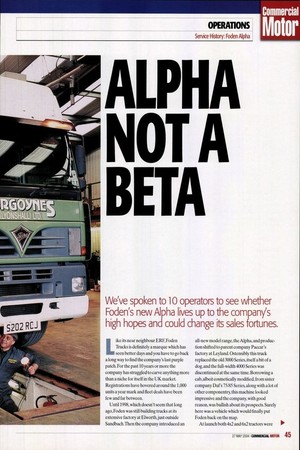
Page 48
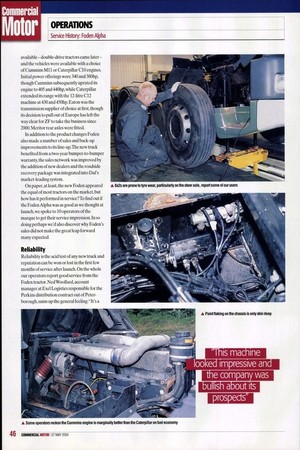
Page 49
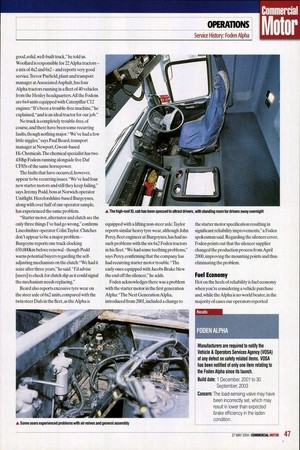
Page 51
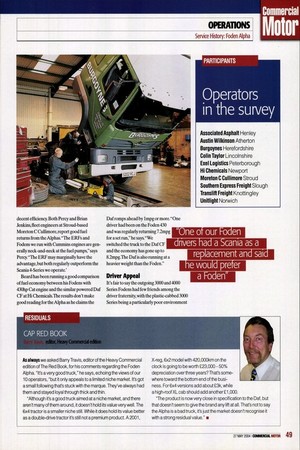
Page 52
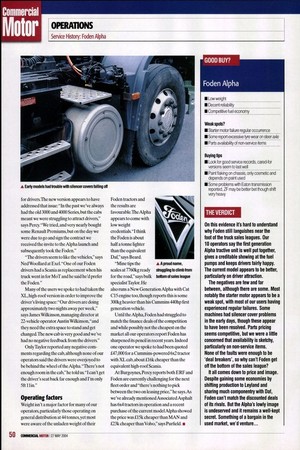
Page 50
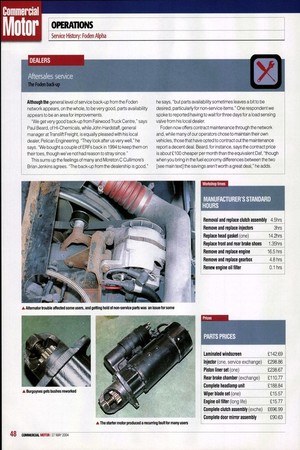
If you've noticed an error in this article please click here to report it so we can fix it.
We've spoken to 10 operators to see whether Foden's new Alpha lives up to the company's
high hopes and could change its sales fortunes.
Like its near neighbour ERF,Foden Trucks is definitely a marque which has seen better days and you have to go back a long way to find the company's last purple patch. For the past 10 years or more the company has struggled to carve anything more than a niche for itself in the UK market. Registrations have hovered around the 1,000 units a year mark and fleet deals have been few and far between. Until 1998, which doesn't seem that long ago, Foden was still building trucks at its extensive factory at Elworth,just outside Sandbach.Then the company introduced an
all-new model range, the Alpha, and production shifted to parent company Paccar's factory at Leyland. Ostensibly this truck replaced the old 3000 Series, itself a bit of a dog, and the full-width 4000 Series was discontinued at the same time. Borrowing a cab, albeit cosmetically modified, from sister company Dafs 75/85 Series, along with a lot of other componentry, this machine looked impressive and the company, with good reason, was bullish about its prospects. Surely here was a vehicle which would finally put Foden back on the map. At launch both 4x2 and 6x2 tractors were
available — double-drive tractors came later — and the vehicles were available with a choice of Ctumnins Mll or Caterpillar C10 engines. Initial power offerings were 340 and 380hp, though Cummins subsequently uprated its engine to 405 and 440hp, while Caterpillar extended its range with the 12-litre C12 machine at 430 and 450hp. Eaton was the transmission supplier of choice at first, though its decision to pull out of Europe has left the way clear for ZF to take the business since 2000. Mentor rear axles were fitted.
In addition to the product changes Foden also made a number of sales and back-up improvements to its line-up.The new truck benefited from a two-year bumper-to-bumper warranty, the sales network was improved by the addition of new dealers and the roadside recovery package was integrated into Dafs market-leading system.
On paper, at least, the new Foden appeared the equal of most tractors on the market, but how has it performed in service? To find out if the Foden Alpha was as good as we thought at launch, we spoke to 10 operators of the marque to get their service impression. In so doing perhaps we'd also discover why Foden's sales did not make the great leap forward many expected. Reliability Reliability is the acid test of any new truck and reputation can be won or lost in the first few months of service after launch. On the whole our operators report good service from the Foden tractor. Ned Woollard, account manager at Exel Logistics responsible for the Perkins distribution contract out of Peterborough, sums up the general feeling: "It's a
good, solid, well-built truck," he told us. Woollard is responsible for 22 Alpha tractors — a mix of 4x2 and 6x2 — and reports very good service.Trevor Purfield, plant and transport manager at Associated Asphalt, has four Alpha tractors running in a fleet of 40 vehicles from the Henley headquarters. All the Fodens are 6x4 units equipped with Caterpillar C12 engines: "It's been a trouble-free machine," he explained, "and is an ideal tractor for our job."
No truck is completely trouble-free, of course, and there have been some recurring faults, though nothing major. "We've had a few little niggles," says Paul Beard, transport manager at Newport, Gwent-based Hi-Chemicals.The chemical specialist has two 430hp Fodens running alongside five Daf CF85s of the same horsepower.
The faults that have occurred, however, appear to be recurring issues. "We've had four new starter motors and still they keep failing," says Jeremy Podd, boss at Norwich operator Unitlight. Herefordshire-based Burgoynes, along with over half of our operator sample, has experienced the same problem.
"Starter motor, alternator and clutch are the only three things I've had go wrong," confirms Lincolnshire operator Colin Taylor. Clutches don't appear to be a major problem — Burgoyne reports one truck clocking 650,000km before renewal though Podd warns potential buyers regarding the selfadjusting mechanism on the clutch: "We had it seize after three years," he said. "I'd advise [users] to check for clutch slip as it could signal the mechanism needs replacing." Beard also reports excessive tyre wear on the steer axle of 6x2 units, compared with the twin steer Dafs in the fleet, as the Alpha is
equipped with a lifting non-steer axle.Taylor reports similar heavy tyre wear, although John Percy, fleet engineer at Burgoynes, has had no such problems with the six 6x2 Foden tractors in his fleet. "We had some teething problems," says Percy, confirming that the company has had recurring starter motor trouble. "The early ones equipped with Jacobs Brake blew the end off the silencer," he adds. Foden acknowledges there was a problem with the starter motor in the first generation Alpha:"The Next Generation Alpha, introduced from 2001, included a change to
the starter motor specification resulting in significant reliability improvements," a Foden spokesman said. Regarding the silencer cover, Foden points out that the silencer supplier changed the production process from April 2000, improving the mounting points and thus eliminating the problem. Fuel Economy Hot on the heels of reliability is fuel economy when you're considering a vehicle purchase and, while the Alpha is no world beater, in the majority of cases our operators reported
decent efficiency. Both Percy and Brian Jenkins, fleet engineers at Stroud-based Moreton C Cullimore, report good fuel returns from the Alphas. "The ERFs and Fodens we run with Cummins engines are generally neck-and-neck at the fuel pumps," says Percy. "The ERF may marginally have the advantage, but both regularly outperform the Scania 4-Series we operate.' Beard has been running a good comparison of fuel economy between his Fodens with 430hp Cat engine and the similar powered Daf CF at Hi Chemicals.The results don't make good reading for the Alpha as he claims the Daf romps ahead by lmpg or more. "One driver had been on the Foden 430
and was regularly returning 7.2mpg for a set run," he says."We switched the truck to the Daf CF and the economy has gone up to 8.2mpg.The Daf is also running at a heavier weight than the Foden." Driver Appeal It's fair to say the outgoing 3000 and 4000 Series Fodens had few friends among the driver fraternity, with the plastic-cabbed 3000 Series being a particularly poor environment
for drivers. The new version appears to have addressed that issue: "In the past we've always had the old 3000 and 4000 Series, but the cabs meant we were struggling to attract drivers," says Percy. "We tried, and very nearly bought some Renault Premiums, but on the day we were due to go and sign the contract we received the invite to the Alpha launch and subsequently took the Foden."
"The drivers seem to like the vehicles," says Ned Woollard at Exel."One of our Foden drivers had a Scania as replacement when his truck went in for MoT and he said he'd prefer the Foden."
Many of the users we spoke to had taken the XL, high-roof version in order to improve the driver's living space: "Our drivers are doing approximately two nights away per week," says James Wilkinson, managing director at 22-vehicle operator Austin Wilkinson, "and they need the extra space to stand and get changed.The new cab is very good and we've had no negative feedback from the drivers."
Only Taylor reported any negative comments regarding the cab, although none of our operators said the drivers were overjoyed to be behind the wheel of the Alpha."There's not enough room in the cab," he told us. "I can't get the driver's seat back far enough and I'm only 5ft llin." Operating factors Weight isn't a major factor for many of our operators, particularly those operating on general distribution at 44 tonnes, yet most were aware of the unladen weight of their
Foden tractors and the results are favourable.The Alpha appears to come with low weight credentials. "I think the Foden is about half a tonne lighter than the equivalent Daf," says Beard. "Mine tips the scales at 7760kg ready for the road," says bulk specialist Taylor. He
also runs a New Generation Alpha with Cat C15 engine too, though reports this is some 300kg heavier than his Cummins 440hp first generation vehicle.
Until the Alpha,Foden had struggled to match the finance deals of the competition and while possibly not the cheapest on the market all our operators report Foden has sharpened its pencil in recent years. Indeed one operator we spoke to had been quoted £47,000 for a Cummins-powered 6x2 tractor with XL cab, about f16k cheaper than the equivalent high-roof Scania. At Burgoynes, Percy reports both ERF and Foden are currently challenging for the next fleet order and "there's nothing to pick between the two on leasing price," he says. As we've already mentioned Associated Asphalt has 6x4 tractors in operation and a recent purchase of the current model Alpha showed the price was f15k cheaper than MAN and f23k cheaper than Volvo," says Purfield. •
FODEN ALPHA
Manufacturers are required to notify the Vehicle & Operators Services Agency (VOSA) of any defect on safety related items. VOSA has been notified of only one item relating to the Foden Alpha since its launch. Build date: 1 December, 2001 to 30 September, 2003
Concern: The load-sensing valve may have been incorrectly set, which may result in lower than expected brake efficiency in the laden condition.
Although the general level of service back-up from the Foden network appears, on the whole, to be very good, parts availability appears to be an area for improvements.
"We get very good back-up from Fairwood Truck Centre," says Paul Beard, of Hi-Chemicals, while John Hardstaff, general manager at Translift Freight, is equally pleased with his local dealer, Pelican Engineering. "They look after us very well," he says. "We bought a couple of ERFs back in 1994 to keep them on their toes, though we've not had reason to stray since." This sums up the feelings of many and Moreton C Cullimore's Brian Jenkins agrees. "The back-up from the dealership is good,"
he says, "but parts availability sometimes leaves a bit to be desired, particularly for non-service items." One respondent we spoke to reported having to wait for three days for a load sensing valve from his local dealer.
Foden now offers contract maintenance through the network and, while many of our operators chose to maintain their own vehicles, those that have opted to contract out the maintenance report a decent deal. Beard, for instance, says the contract price is about £100 cheaper per month than the equivalent Daf, "though when you bring in the fuel economy differences between the two [see main text] the savings aren't worth a great deal," he adds.
As always we asked Barry Travis, editor of the Heavy Commercial edition of The Red Book, for his comments regarding the Foden Alpha. "It's a very good truck," he says, echoing the views of our 10 operators, "but it only appeals to a limited niche market. It's got a small following that's stuck with the marque. They've always had them and stayed loyal through thick and thin. "Although it's a good truck aimed at a niche market, and there aren't many of them around, it doesn't hold its value very well. The 6x4 tractor is a smaller niche still. While it does hold its value better as a double-drive tractor it's still not a premium product. A 2001, X-reg, 6x2 model with 420,000km on the clock is going to be worth £23,000— 50% depreciation over three years? That's some where toward the bottom end of the busi ness. For 6x4 versions add about £3k, while
a high-roof XL cab should add another £1,000. "The product is now very close in specification to the Daf, but that doesn't seem to give the brand any lift at all. That's not to say the Alpha is a bad truck, it's just the market doesn't recognise it with a strong residual value." • Foden Alpha • Low weight II Decent reliability IN Competitive fuel economy
Weak spots? • Starter motor failure regular occurrence • Some report excessive tyre wear on steer axle • Parts availability of non-service items Buying tips • Look for good service records, cared-for versions seem to last well • Paint flaking on chassis, only cosmetic and depends on paint used • Some problems with Eaton transmission reported, ZF may be better bet though shift very heavy THE VERDICT
On this evidence it's hard to understand why Foden still languishes near the foot of the truck sales leagues. Our 10 operators say the first generation Alpha tractive unit is well put together, gives a creditable showing at the fuel pumps and keeps drivers fairly happy. The current model appears to be better, particularly on driver attraction.
The negatives are few and far between, although there are some. Most notably the starter motor appears to be a weak spot, with most of our users having experienced regular failures. Some machines had silencer cover problems in the early days, though these appear to have been resolved. Parts pricing seems competitive, but we were a little concerned that availability is sketchy, particularly on non-service items. None of the faults were enough to be 'deal breakers', so why can't Foden get off the bottom of the sales league?
It all comes down to price and image. Despite gaining some economies by shifting production to Leyland and sharing much componentry with Daf, Foden can't match the discounted deals of its rivals. But the Alpha's lowly image is undeserved and it remains a well-kept secret. Something of a bargain in the used market, we'd venture...






























































































































































































